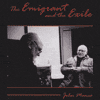
JOHN MUNRO - The Emigrant And The Exile
RoseDog Books ISBN: 978-1-4349-8346-6
John Munro is a singer-songwriter and a fine guitar player. He is best known for his association with Eric Bogle, now going back for three decades.
He has more in common with Eric of course than just the professional link. They both spent their formative years in Scotland and both emigrated to Australia as “£10 Pommies”. Perhaps we should really call them £10 Jocks, since one of the most plausible explanations as to that word pommie’s etymology, is that it stands for the original convicts who were deemed a P.O.M.E. (Prisoner of Mother England), and no Scot will ever stand for that!
John came with his family at just 17 in 1964; Eric came alone in 1969, aged 24. By the time they got together professionally in 1980, Eric was carving out a solid and promising career as a successful troubadour and recording artiste. His first album was recorded on a German tour in 1976.
But he knew that artistically, he needed John’s superb guitar and vocal accompaniment. And as this book shows, needing him in other ways too. (And John needing Eric, similarly). Two guys who fitted each other like the proverbial glove.
And so now these two – the emigrant Bogle, who became an Australian citizen in 1982, and the exiled Munro (a man who loves Australia but still calls Scotland his true home, and has thus never taken the Aussie oath of allegiance) - are looking back on one heck of an eventful joint experience.
Note that I say that the two of them look back. That is not a slip of my pen: for although it is 100% John’s book, he asked Eric for approval, first. And as a fair amount of the content is about Eric (and indeed features many Bogle anecdotes), it is not pushing things, to call it a joint book.
Even down to the layout.
For when the book deals at the start, with the early Scottish years when they had of course never met each other, their stories are by definition, quite disparate ones. Yet Munro cleverly walks a neat chronological line: a chapter on tiny-tot Eric and family, is followed by one on the similarly aged John and his clan. And so on, right up the age ranges, to them both sailing from Southampton.
Mentioning that Hampshire port there, leads me to my one adverse criticism of the book: the fact that the proof reader needs shooting! Okay, I can just about live with Southampton being spelt more than once with a double H. But hey, a book by a folk luminary really should get a cappella right. And they fail to, again, more than once. Stan Rogers died aged 33, and not 34 as John states; Jake Thackray did not spell his name Thackery; the spelling of the word possess should feature the letter S, 4 times (and not 3, as on page 163). These are simple basics that are so easy to check, folks. And in the 4th para on page 114, total confusion reigns supreme. A pasting/cutting job has gone wrong there, methinks.
But in a way, let me breathe that whole last paragraph of mine back in. I don’t want to nit-pick because this really is an enjoyable book. And it’s made enjoyable by the utter candour of the author. Lines abound that make you sit up and embark on a sharp intake of breath.
Like what exactly? Well, let me whet your appetite with some samples:
P.133 “Eric has gradually become a bit irritated with too many floor singers when he’s performing.”
P.149 (Of Stan Rogers, a man John really admired as an artiste): “On two occasions at the conclusion of the day’s music, I found myself in a small group, including Stan, discussing this and that. To me, on the basis admittedly of limited contact, he seemed to be overbearing and arrogant during those discussions.”
P.150. (Of Alex Campbell, just a few years before he died): “Eric and I were performing at the Skagen Festival and, typically with eyes closed, we were into a chorus of No Man’s Land when a strange sound prompted me to look around. I heard this grating gravelly noise and thought one of the monitors had blown a cone. I saw that Alex had joined us on stage and the sound was him singing. It was embarrassing and sad.”
P.151 tells the story of them performing at London’s Capital Radio in 1982. There was a technicians’ trade union dispute at the time and a picket line formed. When it was explained to Jake Thackray, he turned heel for home, refusing to cross the picket line.
Not so Eric. He rang the London branch of the Musicians’ Union, and when he discovered that they were apparently not supporting the techies’ union in this dispute, he and John determinedly crossed the line.
Now, with politically incorrect stuff like that, who can resist a book like this? I know that I cannot.
Dai Woosnam
| Buy
this CD online from The Listening Post The Listening Post is the CD mailorder service of The Living Tradition magazine. This album was reviewed in Issue 89 of The Living Tradition magazine. |

